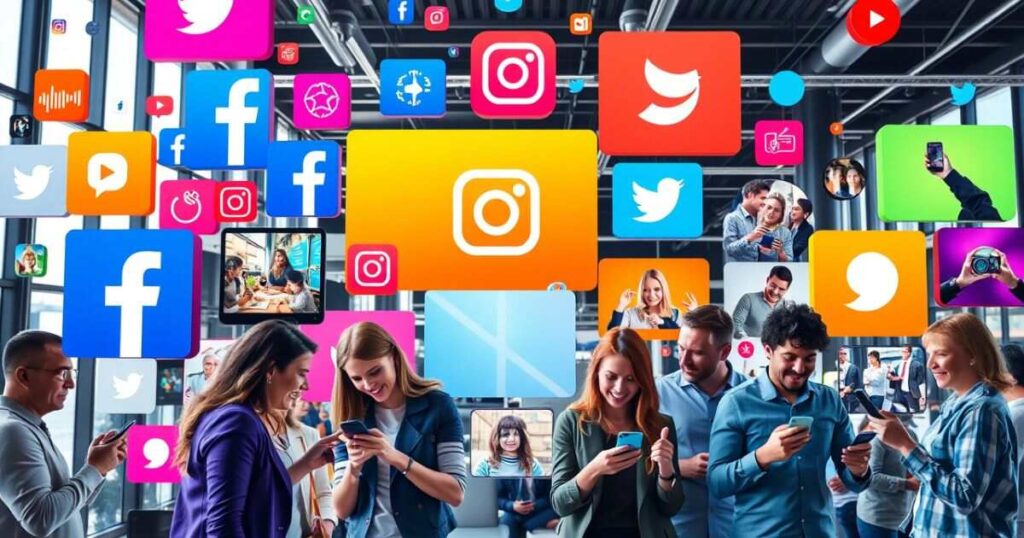Synonyms & Antonyms for Social Media help us find different ways to describe online platforms and interactions. If you’re looking for a social media content synonym, you might use words like “digital networking” or “online community.” But what’s another word for social media in a broader sense? Terms like “social networks,” “online forums,” or “digital engagement” work well.
On the other hand, if you need media antonyms, think of terms like “offline communication” or “traditional media.” Some synonyms for social media include “social platforms” and “interactive media.” If you’re wondering another way to say social media, try “internet networking” or “digital interaction.” Knowing synonyms & antonyms for social media helps improve writing and creativity. Whether you’re creating content or just expanding your vocabulary, these alternatives make communication more engaging and precise.
What Does Social Media Mean?

Let’s start with the basics. Social media refers to digital platforms or websites that allow people to share content, communicate, and interact online.
This includes posting photos, sharing videos, engaging in discussions, or exchanging updates. The term emphasizes the social aspect connecting people, whether they are friends, colleagues, or strangers with similar interests.
Example 1:
Platforms like Facebook, Instagram, and TikTok connect billions worldwide, enabling them to share experiences and ideas in real time.
Example 2:
On Twitter and LinkedIn, users engage in conversations, follow trends, and network with professionals across different industries.
In essence, social media is the digital town square of the 21st century, bringing people together regardless of distance.
Synonyms & Antonyms for Social Media as a Noun and Verb
synonyms & antonyms for social media as a noun include digital networking, online community, social platforms, virtual forums, and interactive media. These words describe the spaces where people connect, share, and engage online. If you’re looking for a social media content synonym, terms like digital engagement or internet networking work well.
For media antonyms, consider words like offline communication, face-to-face interaction, traditional media, print media, or physical networking. These words represent communication methods that don’t rely on the internet. If you’re wondering what’s another word for social media, options like social networks or digital communities fit the description.
When using synonyms & antonyms for social media as a verb, alternatives include posting, sharing, tweeting, engaging, or networking. These words describe actions taken on platforms like Facebook, Instagram, and Twitter. If you need another way to say social media in this context, try words like broadcasting online or content sharing.
For opposite verbs, you might use disconnecting, logging off, ignoring, avoiding, or withdrawing. These words describe stepping away from digital platforms and focusing on real-world interactions. Understanding synonyms & antonyms for social media can make communication more dynamic and precise.
Using different synonyms & antonyms for social media enhances writing, while knowing media antonyms helps contrast online and offline interactions. Whether you’re creating content or expanding vocabulary, knowing what’s another word for social media ensures variety and clarity in communication.
Synonyms and Antonyms for Social Media
synonyms & antonyms for social media include digital networking, online communities, social platforms, virtual forums, and interactive media, all of which describe spaces for online connection and content sharing.
If you’re looking for another way to say social media, terms like social networks or internet networking work well.
On the other hand, media antonyms refer to offline communication methods, such as face-to-face interaction, traditional media, print media, and physical networking, which emphasize real-world engagement instead of digital connections.
Synonyms for Social Media
Below are 10 synonyms for social media, categorized by context:
| Synonym | Meaning | Example |
| Social Networks | Platforms connecting individuals. | “LinkedIn is a social network for professionals.” |
| Digital Platforms | Online tools for sharing content. | “Instagram is one of the most popular digital platforms for visuals.” |
| Online Communities | Groups formed around shared interests. | “Reddit hosts various online communities for diverse discussions.” |
| Interactive Media | Media allowing user interaction. | “TikTok thrives as interactive media where users create short videos.” |
| Networking Sites | Platforms for forming connections. | “Networking sites like Facebook help maintain long-distance relationships.” |
| Social Channels | Mediums for social interaction. | “Brands use social channels to communicate with their audience.” |
| Web-based Networks | Networks accessible through the internet. | “Web-based networks provide spaces for sharing and collaboration.” |
| Digital Engagement Platforms | Tools for interacting with audiences online. | “Companies use digital engagement platforms for customer outreach.” |
| Virtual Social Networks | Online systems mimicking real-world connections. | “Virtual social networks allow users to connect globally in real time.” |
| Online Communication Hubs | Platforms facilitating discussions and messaging. | “Discord serves as an online communication hub for gamers and communities.” |
Antonyms for Social Media
Below are 10 antonyms for social media, categorized by context:
| Antonym | Meaning | Example |
| Face-to-Face Interaction | Direct, in-person communication. | “Meeting in person allows for better face-to-face interaction.” |
| Traditional Media | Non-digital forms of communication. | “Newspapers and TV are examples of traditional media.” |
| Print Media | Physical publications like books and magazines. | “Many people still prefer print media over digital platforms.” |
| Physical Networking | Building connections through real-life interactions. | “Attending conferences helps with physical networking.” |
| Offline Communication | Communication that doesn’t rely on the internet. | “Phone calls and handwritten letters are forms of offline communication.” |
| Personal Conversations | Private, direct exchanges between people. | “Personal conversations often feel more meaningful than online chats.” |
| Analog Communication | Non-digital means of exchanging information. | “Radio and landline phones are examples of analog communication.” |
| Local Gatherings | Community-based in-person meetups. | “Town hall meetings encourage local gatherings and discussions.” |
| Private Correspondence | Direct, confidential exchanges like letters. | “Sending a letter is a form of private correspondence.” |
| Verbal Communication | Spoken interaction without digital tools. | “Verbal communication is key in everyday interactions.” |
Examples of Social Media from Books and Articles
Social media appears in many books and articles, shaping modern communication and culture. Writers analyze its impact, advantages, and drawbacks, offering real-world examples. From fictional portrayals to academic studies, social media plays a central role in storytelling and research.
In the novel The Circle by Dave Eggers, social media is depicted as an all-encompassing digital world where privacy erodes. The protagonist, Mae Holland, becomes part of a massive tech company that promotes constant sharing, highlighting both the power and dangers of online exposure.
Sherry Turkle’s Alone Together explores how social media affects human relationships. She discusses how platforms like Facebook and Twitter create the illusion of connection while often leading to loneliness. The book uses real-life examples to explain how digital interactions shape emotions and social behavior.
In So You’ve Been Publicly Shamed, Jon Ronson examines the impact of social media on personal reputation. Through case studies, he shows how viral content can lead to online shaming, affecting people’s careers and mental health. The book highlights the power of social media to amplify both praise and criticism.
The novel Super Sad True Love Story by Gary Shteyngart presents a dystopian future where social media dominates society. People constantly rate each other using digital devices, reducing human worth to online popularity. This satirical take on social networking shows its potential to influence self-esteem and relationships.
Cal Newport’s Digital Minimalism suggests limiting social media use for a healthier lifestyle. The book provides examples of individuals who stepped away from platforms like Instagram and Twitter to regain focus and personal freedom. It encourages intentional social media use rather than constant engagement.
A study published in The Journal of Social and Personal Relationships explores how social media strengthens long-distance friendships. The research shows that people use platforms like WhatsApp and Snapchat to maintain close ties despite physical separation, proving the positive effects of digital connection.
Related Guide:
Abbreviation for Kindergarten? Definition & Meaning
Why Synonyms & Antonyms for Social Media is Important
synonyms & antonyms for social media Social media plays a huge role in communication, marketing, and online engagement. Using synonyms and antonyms for social media helps improve clarity, avoid repetition, and enhance SEO.
Whether in writing, branding, or everyday conversations, having alternative terms makes content more dynamic and impactful.
1. Enhancing Communication and Clarity
Using synonyms for social media helps improve communication by avoiding repetition. Whether in conversations, writing, or marketing, having alternative terms makes your message more engaging and easier to understand. For instance, instead of always saying “social media,” you can say “digital platforms” or “online communities” to provide variety and context.
2. Improving SEO and Online Visibility
If you’re writing content for blogs, websites, or social media itself, using different synonyms helps boost search engine optimization (SEO). Search engines recognize keyword variations, making content more discoverable. Phrases like “social networks,” “interactive media,” and “networking sites” help attract a broader audience and improve rankings.
3. Strengthening Marketing and Branding
Marketers use various terms to tailor their messaging to different demographics. Some brands may refer to their platforms as “digital engagement platforms” to sound more professional, while others may use “social channels” for a casual appeal. Understanding these synonyms allows businesses to craft compelling campaigns that resonate with their audience.
4. Creating a Professional Tone in Business

In professional settings, using alternative terms for social media can make communication sound more polished. Instead of saying, “We focus on social media growth,” a company might say, “We enhance brand visibility through digital platforms.” This slight variation helps convey expertise while maintaining clarity.
5. Adapting to Industry Trends
Technology and digital communication evolve constantly. New terms emerge while others become outdated. Knowing various synonyms for social media helps professionals stay updated with industry trends. For example, “web-based networks” or “virtual social spaces” may be used more frequently in certain tech-focused discussions.
6. Understanding Contextual Differences
Different words have different implications. “Social networks” emphasize personal connections, while “media platforms” focus on content-sharing. Similarly, knowing antonyms like “traditional media” or “face-to-face interaction” helps contrast online and offline communication. This is useful when discussing technology’s impact on society.
7. Enriching Writing and Content Creation
Writers and content creators benefit from using varied terms. Instead of repeatedly mentioning “social media,” they can use “interactive media” or “networking platforms” to keep readers engaged. This makes articles, blogs, and marketing materials more dynamic and enjoyable to read.
8. Avoiding Redundancy in Conversations
In daily conversations, constantly using the same phrase can sound repetitive. Mixing in synonyms like “digital networks” or “online communities” helps keep discussions fresh and natural. This is especially helpful in professional presentations or academic discussions where clarity and engagement matter.
9. Expanding Educational and Research Understanding
Students, researchers, and academics benefit from knowing various terms for social media. In research papers or studies, using multiple terms improves writing quality and demonstrates a deeper understanding of digital communication. For example, discussing “interactive platforms” rather than just “social media” can add more precision to an argument.
10. Boosting Social Media Strategy

Ironically, knowing different ways to say “social media” can help improve social media itself. Content creators, influencers, and brands can use varied terms in posts, captions, and hashtags to reach diverse audiences. This makes their content more discoverable and appealing across different platforms.
FAQ’s
What are different terms used for online platforms?
Social networks, digital platforms, and interactive media are all part of Synonyms & Antonyms for Social Media that describe online spaces for communication and content sharing.
How can alternative words improve online content?
Using varied terms from Synonyms & Antonyms for Social Media makes writing more engaging, avoids repetition, and helps with SEO by reaching a broader audience.
Why is it useful to know different names for online interactions?
Knowing Synonyms & Antonyms for Social Media helps writers, marketers, and businesses create fresh content while adapting to different tones and professional settings.
How do antonyms highlight the difference between online and offline communication?
Terms like print media, face-to-face interactions, and traditional media contrast with Synonyms & Antonyms for Social Media, showing the shift from offline to digital communication.
How does using multiple terms benefit digital marketing?
Marketers use Synonyms & Antonyms for Social Media to refine branding, improve search rankings, and create engaging content that resonates with different audiences online.
Conclusion
Understanding Synonyms & Antonyms for Social Media can significantly enhance your content and communication. Whether you’re looking for a social media content synonym or searching for synonyms for social media, having alternative expressions can help keep your writing fresh and engaging. When exploring another way to say social media, you might consider terms like “online platforms” or “digital networking.” These substitutions ensure that your content avoids repetition and appeals to a broader audience. It’s also valuable to know media antonyms, such as “offline” or “traditional communication,” to create a well-rounded understanding of the digital landscape.
By using Synonyms & Antonyms for Social Media, you can diversify your vocabulary and effectively express ideas about social media in various ways. This will not only improve your content but also resonate with diverse readers. The right synonyms for social media and media antonyms add clarity and variety, making your writing more versatile and dynamic. Always keep in mind whats another word for social media and explore these alternatives to refine your message.

Atlas Reid is an experienced administrator with 5 years of expertise in managing operations, streamlining processes, and ensuring efficiency. Skilled in leadership, organization, and problem-solving to drive business success.








